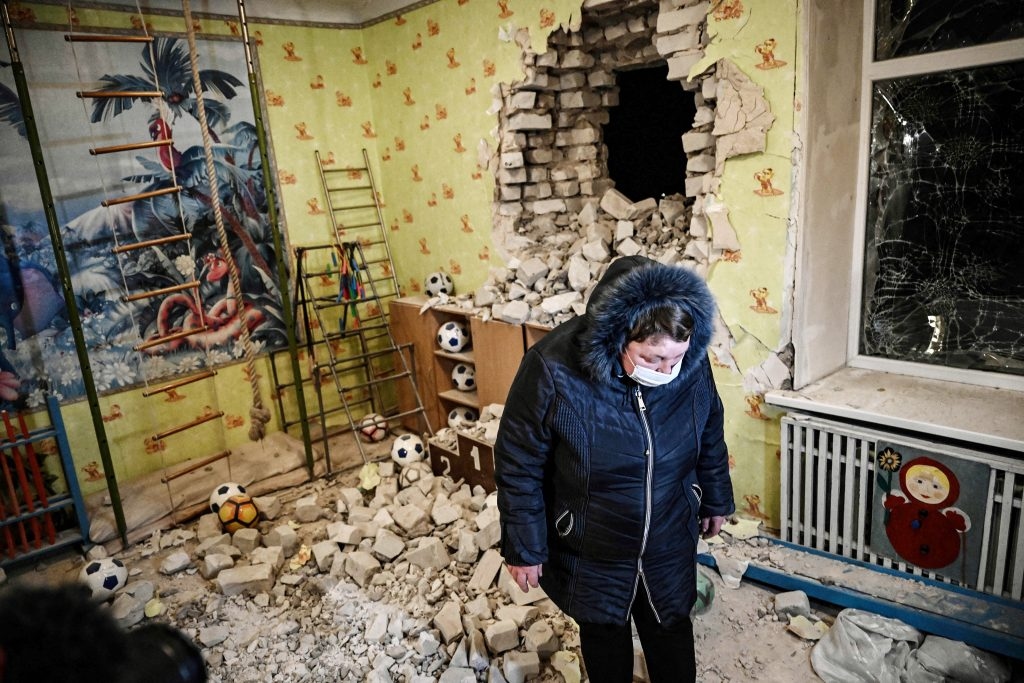Ukrainians inside occupied Donbas stuck between hope and fear

In the last 72 hours, Russia’s eight-year-long war against Ukraine has rapidly escalated. On Feb. 18, OSCE reported 870 ceasefire violations in Luhansk and Donetsk oblasts, which is nearly a fourfold increase compared to the 2021 daily average of violations.
Russian-led militants have been actively shelling Ukrainian territory all along the front line, killing two Ukrainian soldiers, wounding civilians, and damaging homes and civilian infrastructure.
At the same time, Russian proxy leaders in occupied Donbas declared mobilization, and called on civilians, mainly women and children, to evacuate to Russia en masse, citing plans of Ukraine to launch an offensive.
Amid the heightened tensions, the Kyiv Independent spoke to Ukrainians who live in occupied Donbas. Their real names were changed for security reasons, as many in occupied territories are targeted for pro-Ukrainian sympathies.
“It feels like they are making an illustration for Russian TV-channels,” said Arthur, a Ukrainian based in Donetsk.
Similar to almost all locals that the Kyiv Independent reached out to, Arthur’s wife was worried their phones were wiretapped by the occupants, and he could face repercussions for giving an interview to a Ukrainian news outlet. She didn’t want him to talk, so Arthur exchanged text messages with the Kyiv Independent instead.
“I don’t believe in an attack by the Ukrainian military,” he wrote. “Considering that there are 200,000 (Russian) troops from three sides. You don’t have to read Sun Tzu to understand that it’s logical to begin an offensive when they are not there.”
Michael Carpenter, the U.S. ambassador to OSCE, said Russia has “probably amassed between 169,000-190,000 personnel in and near Ukraine,” calling it the most significant military mobilization in Europe since World War II.
At the same time, Ukraine’s Defense Minister Oleksii Reznikov said on Feb. 18 that the number was 149,000.
Maksym, who also lives in Donetsk, is relieved that he was finally able to fuel up his car – it was impossible to do so yesterday, on Feb. 18, as large numbers of automobiles lined up at gas stations to stock up on fuel.
“I can’t leave everything, my home is here, and I have nowhere to flee to,” Maksym told the Kyiv Independent. Together with his father and brother, Maksym plans to stay in Donetsk. As of Feb. 19, he can't leave anyway: Men of 18-55 years old are barred from leaving the occupied territories due to declared general mobilization.
He says the locals don’t really believe that a full-scale war will begin, yet anxiety is still present.
“It’s like the city came to life again – everyone is moving, trying to get gas or something else,” he said.
Maksym also says Donetsk is “loud,” as Russian-led militants continue shelling Ukrainian villages near the city, trying to provoke a reaction from Ukraine’s Armed Forces to justify a further attack on Ukraine.
The militants are shelling civilian settlements they occupy to shift the blame to Ukraine, Ukraine’s military says.
“The occupying forces are trying to frame their shelling of their own positions as Ukraine’s responding fire,” Ukraine’s Armed Forces said in a statement.
Yet Ukraine responds “only in the event of a threat to the lives of personnel or civilians,” Commander-in-Chief of Ukraine’s Armed Forces Valery Zaluzhny said in an address on Feb. 19. “We do not succumb to provocations. We do not fire on residential areas where militants have cynically placed their positions.”
“Anxiety in occupied territories is being raised artificially,” says Alina, a social worker in Severodonetsk, an eastern city of some 100,000 people, less than 100 kilometers from occupied Luhansk. Severodonetsk is controlled by the Ukrainian government, but Alina's work takes her to the occupied territories.
The non-profit where Alina works helps orphans and struggling families. It has a now-closed office in Stanytsia Luhanska – a Ukraine-controlled village near the front line, which was actively shelled by Russian-led militants on Feb. 17. Russian proxies targeted a kindergarten, damaging the building and injuring three staff members. Children were reportedly inside at the time of the shelling, but none of them were harmed.

Amid these tensions, families with kids began to flee Stanytsia Luhanska, withdrawing their children from local schools, Alina says. Recent shelling became a trigger for children, some of whom relapsed into medical conditions, like enuresis (involuntary urination) or stuttering, which they’ve acquired when the war began.
“Everyone (in occupied Donbas) is trying to stay stable, but they are worried nevertheless,” Alina told the Kyiv Independent. She’s been calling friends and colleagues who live under occupation, monitoring the situation that rapidly escalated over the last few days.
On Feb. 18, leaders of Russia’s proxies in occupied Donbas announced a mass evacuation of local civilians to Russia, accusing Ukraine of preparing an offensive into the occupied territory, without evidence.
The next day, they ordered a mobilization of all local men 18-15 years of age – these men are now banned from leaving Russian-occupied territories. As a result, many families are refusing to leave without their male family members.
“Many families decided not to leave, because the wives don’t want to leave their husbands, and don’t want to flee alone,” Alina told the Kyiv Independent. “There is no mass exodus.”
But a local in Luhansk, Anna, paints a grim picture.
“There is panic, people are leaving, schools are closed. There is a rush in grocery stores… Shops, gyms, and other places are getting closed,” says Anna.
She told the Kyiv Independent that she doesn’t yet plan to leave the city, but once significant shelling starts, she will immediately run to Ukraine-controlled Severodonetsk.
Yet she refused to say whether she believes Russian claims about a potential attack from Ukraine.
"I'm far from politics," she said.









